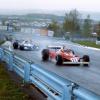Indy 500 Fastest Lap?
#1

Posted 03 April 2002 - 13:59
Advertisement
#2

Posted 03 April 2002 - 14:40
http://www.geocities...astestlaps.html
and the fastest qual lap from 1912->
http://www.geocities...stslowqual.html
Maybe thay did not record FL in the early days?
/Viktor
#3

Posted 03 April 2002 - 16:49
#4

Posted 03 April 2002 - 17:55
#5

Posted 03 April 2002 - 18:25
Originally posted by Hans Etzrodt
How do we define fastest leading lap, at least for me to understand. I have a thick skull!
I think your skull is anything but thick... Sometimes we just need a refresher. The fastest leading lap is one that is turned in each and every lap by the leader of the race. This "fastest lap" may not be the overall fastest of that particular lap. Those in pursuit of the lead maybe turning out a quicker lap time.
Of course there will not be "fastest laps" or any laps for that matter, for Indy from the years 1917 - 1918 and from 1942 - 1945.
#6

Posted 03 April 2002 - 18:55
#7

Posted 03 April 2002 - 19:37
Originally posted by ensign14
... Whenever you see stats for US racing, you see race winners and pole winners, no fastest lap lists.
Beg to differ with you Ensign. On the contrary, there have often been fastest lap times posted in a wide variety of American events.
CART, IRL, ALMS, Grand-Am, SCCA and other series have included fastest lap scoring into the record books.
Some recent examples:
--------------------------------------------------------------------------------
2001 RACE RESULTS
SEBRING
ROUND 2
49TH ANNUAL EXXON SUPERFLO 12 HOURS AT SEBRING
PRESENTED BY DODGE
SEBRING INTERNATIONAL RACEWAY / SEBRING, FL
MARCH 17, 2001
OFFICIAL RESULTS
Length of Race: 370 laps for 1369 miles
Time of Race: 12 hours 38.122 seconds
Margin of Victory: .482 seconds
LMP900 Average Speed: 113.983 mph
LMP675 Average Speed: 81.674 mph
GTS Average Speed: 102.093 mph
GT Average Speed: 100.330 mph
FASTEST QUALIFIERS:
LMP900: #2 Emanuele Pirro 1:49.110 122.079 mph
LMP675: #11 Claudia Huertgen 2:01.074 110.015 mph REC
GTS: #26 Oliver Gavin 2:00.426 110.607 mph
GT: #23 Sascha Maassen 2:06.764 105.077 mph REC
FASTEST LAP:
LMP900: #2 Tom Kristensen Lap #237 1:49.666 121.460 mph REC
LMP675: #11 Claudia Huertgen Lap #94 2:01.365 109.752 mph REC
GTS: #26 Terry Borcheller Lap #215 2:01.043 110.044 mph REC
GT: #42 Jörg Müller Lap #32 2:06.682 105.145 mph REC
Rolex 24 At Daytona Official Results
Event: Rolex 24 at Daytona
Time Of Race: 24:00:02
Run: 39th Rolex 24 at Daytona
Avg. Speed: 97.293
Date: 2/3/01
Margin of Victory: laps
Time: 1:00:00 PM
Fast Race Lap: 01:41.875
Cautions: 9 for 34 Laps
Please check out this Daytona Results list, it has the list for fastest lap by each entrant.
Here are the fastest laps at Indy from 1951 to the present. I don't know if they are "leading" laps or fastest "overall" laps.
Indianapolis 500 Fastest Laps
Year... Speed.... Driver..... Lap
1951 133.809 Lee Wallard 23
1952 135.135 Bill Vukovich 8
1953 135.870 Bill Vukovich 27
1954 140.537 Jack McGrath 29
1955 141.354 Bill Vukovich 27
1956 141.416 Paul Russo 19
1957 143.426 Jim Rathmann 127
1958 144.300 Tony Bettenhausen 55
1959 145.419 Johnny Thomson 64
1960 146.128 Jim Rathmann 4
1961 147.589 Troy Ruttman 91
1962 148.295 Parnelli Jones 56
1963 151.541 Parnelli Jones 114
1964 157.646 Bobby Marshman 15
1965 157.508 A.J. Foyt 2
1966 159.179 Jimmy Clark 18
1967 164.926 Parnelli Jones 6
1968 168.666 Lloyd Ruby 94
1969 166.512 Roger McCluskey 20
1970 167.785 Joe Leonard 50
1971 174.961 Mark Donohue 66
1972 187.539 Mark Donohue 150
1973 186.916 Roger McCluskey 55
1974 191.408 Wally Dallenbach 2
1975 187.110 Gordon Johncock 2
1976 186.027 A.J. Foyt 2
1977 192.678 Danny Ongais 42
1978 193.924 Mario Andretti 75
1979 193.216 Mike Mosley 184
1980 190.074 Johnny Rutherford 149
1981 198.937 Gordon Johncock 159
1982 200.535 Rick Mears 122
1983 197.507 Teo Fabi 3
1984 204.815 Gordon Johncock 52
1985 204.937 Rick Mears 14
1986 209.152 Bobby Rahal 200
1987 205.011 Roberto Guerrero 57
1988 209.517 Rick Mears 166
1989 222.469 Emerson Fittipaldi 85
1990 222.547 Emerson Fittipaldi 91
1991 222.178 Arie Luyendyk 109
1992 229.118 Michael Andretti 166
1993 214.807 Emerson Fittipaldi 198
1994 220.680 Emerson Fittipaldi 121
1995 224.009 Scott Goodyear 179
1996 236.103 Eddie Cheever 78
1997 215.626 Tony Stewart 105
1998 214.746 Tony Stewart 19
1999 218.882 Greg Ray 101
2000 218.494 Buddy Lazier 198
From SI: Indy Fastest Laps
#8

Posted 03 April 2002 - 20:47
#9

Posted 03 April 2002 - 20:50
"Fastest leading laps" until 1964, "fastest race laps" from 1965 onwards. Interesting to note that the "fastest leading lap" was not necessarily the "fastest lap" of the current leader, since it was merely the time between one passage of the leader and the next. The difference? Well, take 1965 as a case in point: "Fastest leading lap" was Clark on 57.22", "fastest race lap" was Foyt on lap 2, 57.14". But Foyt was leading on lap 2! So what happened? Clark had been leading on lap 1, and Foyt overtook him on the next circuit with a 57.14" lap. But since Clark led Foyt by more than 8 hundreths of a second on lap 1, the "leading lap" was more than 57.22". Complicated? Not really: Imagine Clark's first lap was 1 minute flat, and Foyt's 1'01". Now Foyt's total time at the end of lap 2 would be 1'58.14" (1'01" plus 57.14"), and thus the "leading lap" 58.14" (1'58.14" minus 1'00"). Easy!Originally posted by rdrcr
Here are the fastest laps at Indy from 1951 to the present. I don't know if they are "leading" laps or fastest "overall" laps.
#10

Posted 03 April 2002 - 21:14
I never have been able to figure out if this was the fastest lap or the fastest leading lap, but Edmond Cohin listed some "fastest lap" for some pre WWII Indy 500. Of the three you queried about Hans, only 1928 as a FL :
1928 - Duray (Miller) : 199,587 km/h
Let me know if you are interested in other years.
Frank
#11

Posted 03 April 2002 - 22:52
BTW, if you do find out and the speed only is given, just divide the speed (in mph) into 9000 and you'll get the time in seconds.
I'll keep looking...
#12

Posted 04 April 2002 - 04:38
:Originally posted by ensign14
I was thinking of things like the media guides or general histories. They tend to have lists of winners and pole guys, not fastest laps. (Hey, who can time every one of 40+ starters on a half mile oval in NASCAR? In 1953?) So you can see a hero of mine like JD McDuffie in the record books for winning a pole. But no equivalent of Hasemi or Henton.
you got me there...
Originally posted by fines
"Fastest leading laps" until 1964, "fastest race laps" from 1965 onwards. Interesting to note that the "fastest leading lap" was not necessarily the "fastest lap" of the current leader, since it was merely the time between one passage of the leader and the next. The difference? Well, take 1965 as a case in point: "Fastest leading lap" was Clark on 57.22", "fastest race lap" was Foyt on lap 2, 57.14". But Foyt was leading on lap 2! So what happened? Clark had been leading on lap 1, and Foyt overtook him on the next circuit with a 57.14" lap. But since Clark led Foyt by more than 8 hundreths of a second on lap 1, the "leading lap" was more than 57.22". Complicated? Not really: Imagine Clark's first lap was 1 minute flat, and Foyt's 1'01". Now Foyt's total time at the end of lap 2 would be 1'58.14" (1'01" plus 57.14"), and thus the "leading lap" 58.14" (1'58.14" minus 1'00"). Easy!
Yeah, so easy it makes me wonder why I give a **** at all.
#13

Posted 04 April 2002 - 07:12
What Fines is trying to explain is that each time there was a new leader the time for his first leading lap was handicapped by the difference between him and the leader on the previous lap.Originally posted by rdrcr
Yeah, so easy it makes me wonder why I give a **** at all.

So by knowing that the fastest leading lap was 57.22", and fastest race lap was Foyt on lap 2, with 57.14" we know that Foyt must have been handicapped by at least 0.08" seconds for that lap. Otherwise the fastest leading lap would be less than 57.22
We can thus without even knowing the times for the previous lap come to the conclusion that on that lap Foyt must have been more than 0.08 seconds behind the leader (Clark).
#14

Posted 04 April 2002 - 08:13
So then, a 'leading lap' time, although attributed to a specific driver, is actually an indication of the overall pace of the race (or at least, the race for the lead) rather than that of a particular car ?
(I seem to remember the same system prevailed, maybe still does, in track-cycling with the the last-200m times for sprinting)
#15

Posted 04 April 2002 - 10:27
Frank,Originally posted by FEV
.....Of the three you queried about Hans, only 1928 as a FL :
1928 - Duray (Miller) : 199,587 km/h
Let me know if you are interested in other years.
Frank
Thank you, yes I am interested to find out the fastest laps, between 1928 and 1930. Please point out, which one is indicated as FL. Only 1928! So, how are 1929 and 1930 described? Fastest leading lap?
All you others,
Thank you for explaining fastest leading lap. I had never paid attention to those things.
#16

Posted 04 April 2002 - 16:33
To come back to your original question, only for 1928 does Cohin give a fastest lap for the race. Of the pre-1950 races, here are the years for which he gives one :
1912, 1923, 1925, 1926, 1927, 1928, 1937 and 1939. I can post them if anyone is interested.
Oh, and for each of these years the man Cohin credits with the fastest lap also led the race at one stage, so the confusion between FL and FLL won't be sorted out this way !
Frank
#17

Posted 04 April 2002 - 17:22
#18

Posted 04 April 2002 - 18:39
I know that the time difference of the leader of the race and the second place man who catches him and passes him for that lead, must have made up the deficit, plus, be still faster to take the lead on that lap. I've never really "examined" the particulars of why, what and where as so often exhibited here in TNF. Please for give my sarcastic quip. I understand that for some, it is this kind of exactness that clarifies the instance.

















